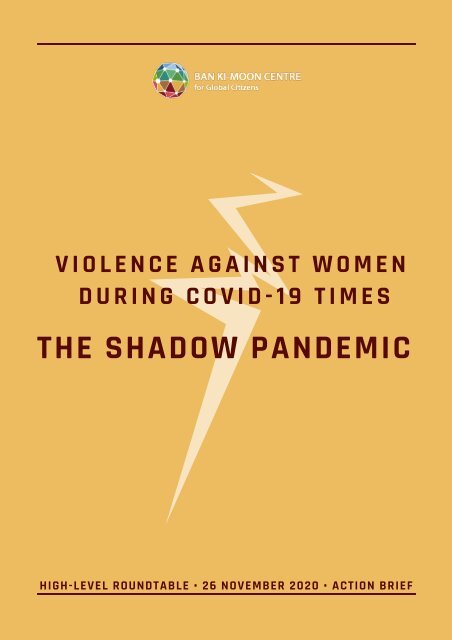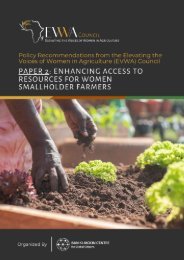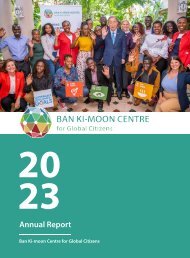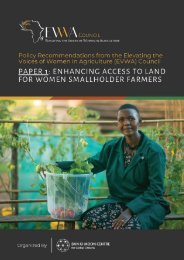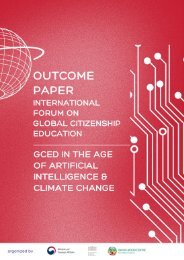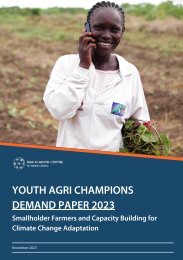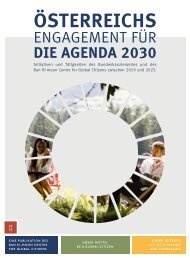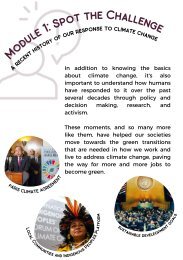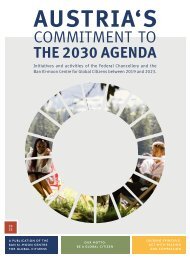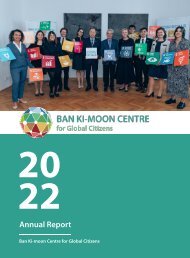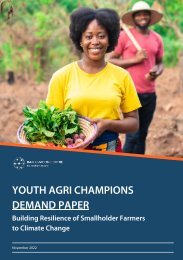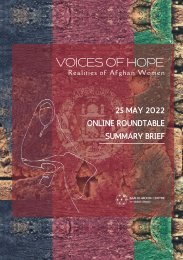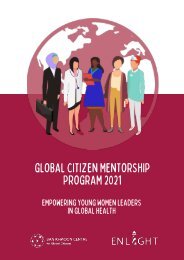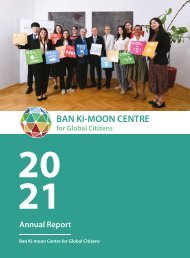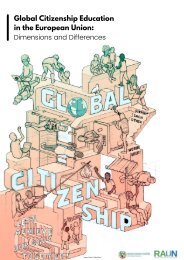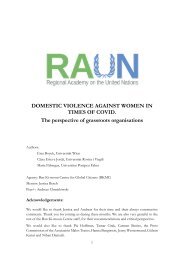Shadow Pandemic Action Brief
The BKMC organized a virtual high-level and multi-stakeholder roundtable on November 26th, 2020, titled “Tackling the Shadow Pandemic – Violence Against Women During COVID-19 Times”. This report is the outcome of the mentioned event.
The BKMC organized a virtual high-level and multi-stakeholder roundtable on November 26th, 2020, titled “Tackling the Shadow Pandemic – Violence Against Women During COVID-19 Times”. This report is the outcome of the mentioned event.
Create successful ePaper yourself
Turn your PDF publications into a flip-book with our unique Google optimized e-Paper software.
V I O L E N C E A G A I N S T W O M E N<br />
D U R I N G C O V I D - 1 9 T I M E S<br />
THE SHADOW PANDEMIC<br />
HIGH-LEVEL ROUNDTABLE • 26 NOVEMBER 2020 • ACTION BRIEF
The <strong>Shadow</strong> <strong>Pandemic</strong><br />
Facts and Statistics<br />
The COVID-19 pandemic is accompanied by a multitude of exacerbated challenges in the global fight against<br />
Violence Against Women and Girls (VAWG). In an effort to stop the coronavirus from spreading, the<br />
containment strategies placed more and more women and girls in vulnerable situations, exposing them to a<br />
<strong>Shadow</strong> <strong>Pandemic</strong> of VAWG, a term coined by UN Women, the United Nation’s Entity for Gender Equality and<br />
the Empowerment of Women. It is estimated that "the COVID-19 pandemic is likely to cause a one-third<br />
reduction in progress towards ending gender-based violence by 2030".[1]<br />
Health workers, such as Simret Tesfaye, a nurse at a woman's shelter in Ethiopia, are experiencing the <strong>Shadow</strong><br />
<strong>Pandemic</strong> and the intensified pressure due to COVID-19 first hand. Tesfaye reports how frontline services have<br />
not been able to deliver adequate support for survivors of VAWG due to a lack of isolation rooms and<br />
insufficient human resources. At the same time, she recounts, survivors have not gone to the police during<br />
the pandemic, making it harder to press charges afterwards and prevent repeated offences. Her work as a<br />
frontline worker has become significantly more challenging during COVID-19 times.[2]<br />
Early warnings anticipated that the measures of confinement and physical distancing could have severe<br />
effects on VAWG. Even before the outbreak of the coronavirus, every 1 in 3 women globally experienced<br />
sexual or physical violence at least once in her lifetime.[3] With half of the world’s population in lockdown,<br />
women and girls are immediately at greater risk of experiencing sexual or physical violence within their<br />
homes and beyond.<br />
Domestic Violence<br />
Other Forms of Violence<br />
Other forms of VAWG are also under immediate<br />
During lockdown measures in the first half of<br />
2020, Argentina experienced a 25% increase of<br />
pressure due to COVID-19. The United Nations<br />
Office on Drugs and Crime warns that "the living<br />
emergency calls reporting domestic violence.<br />
France’s domestic violence cases increased by<br />
conditions of many trafficking victims, such as<br />
those in domestic servitude or sex slavery, forms<br />
30% and the demand for helplines increased by<br />
of exploitation that disproportionately affect<br />
30% in Cyprus and 33% Singapore. The statistics<br />
women and girls” are at severe risk.[6] COVID-19<br />
in Canada, Germany, Spain, the United Kingdom,<br />
also brought along a disruption in efforts to<br />
Australia and the United States reflect similar<br />
prevent child marriages. The United Nations<br />
increasing developments in the reports of<br />
Population Fund (UNFPA) estimates that this<br />
domestic violence and demand for emergency<br />
could result in an additional 13 million child<br />
shelters.[4] At the same time, essential services<br />
marriages to take place between 2020 and 2030<br />
have been compensated. A UK survey found that<br />
that could otherwise have been prevented.<br />
three-quarters (76%) of UK frontline service<br />
UNFPA also pointed out that addressing Female<br />
providers had to decrease their service delivery<br />
Genital Mutilation (FGM) has become more<br />
for VAWG cases because of COVID-19. With<br />
difficult as prevention efforts are compensated.<br />
increasing pressure on health care services due<br />
This could result in a failure to avert 2 million<br />
to the prioritizing of COVID-19 cases, chances are<br />
cases of FGM.[7] Furthermore, the use of the<br />
high that access to urgent support for victims of<br />
internet increasing by 50%-70%, as social life has<br />
VAWG will be disrupted.[5] Moreover, increasing<br />
shifted to the online sphere, is accompanied by a<br />
unemployment due to the accompanying<br />
heightened risk of cyber violence against women.<br />
economic crisis leads to economic dependence,<br />
[8] During the lockdown and confinement, tweets<br />
preventing women from escaping abusive<br />
from India, Indonesia and the Philippines<br />
relationships. Studies have shown that less than<br />
containing misogynistic language doubled week<br />
40% of all women experiencing violence, report<br />
over week in May 2020.[9]<br />
the crime or ask for support.<br />
0 2
affected by violence before<br />
women<br />
COVID-19<br />
in demand for helplines<br />
increase<br />
Cyrus and Singapore<br />
in<br />
in domestic violence<br />
increase<br />
calls in Argentina<br />
emergency<br />
women who face violence<br />
of<br />
or seek help<br />
report<br />
of frontline service<br />
reduction<br />
VAW survivors in UK<br />
for<br />
child marriages to occur<br />
additional<br />
2020 and 2030<br />
between<br />
cases of FGM that<br />
additional<br />
could have been averted<br />
otherwise<br />
in internet use leading to<br />
increase<br />
cyber violence<br />
heightened<br />
Facts and Statistics<br />
1 in 3<br />
High-Level Roundtable<br />
Despite substantial evidence on the negative<br />
The BKMC Co-chairs Ban Ki-moon and Heinz<br />
effect of COVID-19 on VAWG, the Ban Ki-moon<br />
Fischer, Executive Director of UN Women<br />
Centre (BKMC) observed a lack of widespread<br />
Phumzile Mlambo-Ngcuka, former Prime Minister<br />
awareness on the issue. Taking action, the BKMC<br />
of New Zealand Helen Clark, CEO of Avon Angela<br />
Cretu, Regional Director of UN Women Asia and<br />
organized a virtual high-level and multistakeholder<br />
roundtable on November 26th, 2020,<br />
Pacific Mohammad Naciri, and women’s rights<br />
titled “Tackling the <strong>Shadow</strong> <strong>Pandemic</strong> – Violence<br />
activist Trisha Shetty came together to discuss<br />
Against Women During COVID-19 Times”. The<br />
what steps must be taken to address the spike in<br />
event was open to all and held during the<br />
VAWG during COVID-19 times. The event's<br />
international Orange the World campaign.<br />
moderator Monika Froehler, CEO of the BKMC,<br />
Headed by UN Women, the Orange the World<br />
provided insights on facts and statistics on the<br />
campaign raises awareness for VAWG annually<br />
<strong>Shadow</strong> <strong>Pandemic</strong> and asked the diverse<br />
during the 16 Days of Activism against Gender-<br />
audience from 20 different countries to share<br />
Based Violence from the 25th of November, the<br />
their perspectives on VAWG during COVID-19 via<br />
International Day for the Elimination of Violence<br />
online live polling. Considering the exacerbated<br />
Against Women to the 10th of December,<br />
risks in their region, the audience perceived the<br />
International Human Rights Day. The High-Level<br />
expansion of frontline services, awarenessraising,<br />
and education of men and boys to be<br />
Roundtable took place in support of these multistakeholder<br />
efforts to end VAWG.<br />
crucial tools to tackle the <strong>Shadow</strong> <strong>Pandemic</strong>.<br />
Insights from the Opening Speakers:<br />
Ban Ki-moon,<br />
8th Secretary-<br />
General of the<br />
United Nations<br />
Heinz Fischer,<br />
11th President of the<br />
Republic of Austria<br />
Phumzile<br />
Mlambo-Ngcuka,<br />
Executive Director<br />
of UN Women<br />
Violence against women and girls is<br />
Women constitute half of the<br />
We have seen the whole world<br />
one of the most pervasive human<br />
world's population and can only<br />
respond to the coronavirus<br />
rights violations and perhaps the<br />
unfold their full potential when<br />
pandemic, with all hands on deck.<br />
most obvious manifestation of the<br />
free of violence. We must talk<br />
Men’s violence against women is<br />
deep imbalances in power in our<br />
about the changing dynamics of<br />
societies. As a global community,<br />
VAWG during COVID-19. What can<br />
also a pandemic – one that predates<br />
the virus and will outlive it.<br />
we must not look away. We must<br />
we do to protect and support<br />
It too needs our global,<br />
engage in an open dialogue and<br />
women and girls during periods of<br />
coordinated response and<br />
bring all stakeholders to the table.<br />
quarantine, social distancing?<br />
enforceable protocols.<br />
0 4
Key Statements and<br />
Recommendations:<br />
Governments Private Sector International Organizations Civil Society<br />
Rt. Hon. Helen Clark<br />
Hon. Rt Helen Clar<br />
is the former Prime Minister of New Zealand and former UNDP Administrator. Helen Clark<br />
chairs several organizations and serves on multiple public good Advisory Boards. She continuously speaks on<br />
issues related to the Sustainable Development Goals (SDGs) and Women’s Leadership. Sharing her unique<br />
insights as former head of government, Clark shed light on the governmental responsibility to tackle the<br />
<strong>Shadow</strong> <strong>Pandemic</strong>:<br />
Legislation:<br />
To tackle the shadow pandemic, the issue of VAWG must be pushed out of the shadows through legislative<br />
measures. Changing the law to call out domestic violence as an assault is the first step that needs to be<br />
taken.<br />
Governmental Campaigns:<br />
Leading governmental campaigns that carry compelling messages is key to gain the support of other<br />
stakeholders. New Zealand, for example, initiated “It’s not OK” campaign, calling for the need to address and<br />
end VAWG.<br />
Women’s Leadership:<br />
As the proportion of women in parliament grows, issues that predominantly affect women are finally<br />
addressed. The government of Jacinda Ardern of New Zealand successfully pushed for legislation making it<br />
easier for survivors of domestic violence to flee their home while receiving ten days of paid leave.<br />
Women Advisors:<br />
Asking women what they need from policymakers to make their lives safer is crucial. Gender-sensitive<br />
responses can only be effective if women are part of the decision-making and if they are engaged and<br />
involved in designing what is required.<br />
0 5
Key Statements and<br />
Recommendations:<br />
Governments Private Sector International Organizations Civil Society<br />
Cret is the CEO of the global beauty company Avon, a keen advocate for gender equality, and a<br />
Angela Cretu<br />
Angela<br />
champion of Avon's mission to create a better world for all, through women. Under her leadership, Avon has<br />
doubled down on its long-term commitment to tackling gender-based violence, with new programs and<br />
funding to drive positive social change. Representing the private sector, Cretu drew on her experience as best<br />
practice:<br />
Sustainable Missions:<br />
Private sector companies have a responsibility to go beyond selling their products and services and align<br />
their mission and agenda with sustainability and core values of society such as dignity, well-being, and<br />
freedom of choice.<br />
Leveraging Influence:<br />
Private sector companies are highly influential. They can and should do their part to eliminate VAWG by<br />
cooperating with NGOs, legislators, raising awareness, writing letters to governments, or mobilizing funds for<br />
frontline services.<br />
Supporting Employees:<br />
The private sector is responsible for creating earning opportunities for women that allow more flexibility and<br />
contribute to more financial freedom of women. Only 40% of women survivors report their violent<br />
experiences. This gives testimony that more must be done to secure the economic stability of women, to<br />
empower them to leave abusive relationships.<br />
Training Employees:<br />
Businesses should train their employees to read signs of abuse to protect their own communities of<br />
employees and customers. Avon partners with Vital Voices Global Partnership to train its employees in taking<br />
on responsibility in the fight against VAW.<br />
0 6
Key Statements and<br />
Recommendations:<br />
Governments Private Sector International Organizations Civil Society<br />
Naciriis the Regional Director of UN Women for Asia and the Pacific with considerable experience<br />
Mohammad Naciri<br />
Mohammad<br />
in the international development sector working for multiple international organizations. He has supported<br />
Yemen in the formulation of its Gender Strategy and the Gender Responsive Budgeting process and worked in<br />
Kuwait, Iraq, Syria, Lebanon and Cambodia, dealing with issues from human trafficking to ethnic cleansing.<br />
With his extensive background in the multilateral sector, Naciri pointed out the following:<br />
Regional Differences:<br />
In the Asia-Pacific region, the rate of VAWG has been even higher than the global average. Two out of three<br />
women have reported experiences of violence, which underscores the need for regional and local<br />
perspectives in gender-sensitive responses.<br />
Online Violence:<br />
Since lockdowns and physical distancing measures pushed more people online, digital platforms are being<br />
increasingly used to spread sexist and dangerous rhetoric about women, inciting hatred and potentially<br />
provoking violence online and offline. Legislation that criminalizes cyber harassment and stalking must be<br />
expanded and women’s capacity to identify, report and block hateful content must be built.<br />
Patriarchal Structures:<br />
The deeply-rooted ideas of patriarchy exacerbate the vulnerability of women to male violence. It must be a<br />
common effort of all stakeholders to unteach traditional gender-roles, communicate messages and images of<br />
women empowerment, tackle harmful traditional cultural and religious narratives and work with men and<br />
boys to dissolve patriarchal ideas.<br />
International Cooperation:<br />
International organizations play a key role in strengthening systems, improving access to essential services<br />
for survivors in remote areas, raising awareness, and disseminating guidance to governments and<br />
humanitarian actors to help shape services that respond to the increase in VAWG during COVID-19 through<br />
technology and remote support options.<br />
0 7
Key Statements and<br />
Recommendations:<br />
Governments Private Sector International Organizations Civil Society<br />
Trisha Shetty<br />
Trisha S<br />
ettyis a lawyer and full-time social activist, who founded SheSays, a non-profit organization and<br />
online platform that aims to end gender-based discrimination and advance women’s rights in India by<br />
engaging youth as agents of social change. She has dedicated herself to addressing gender-based violence<br />
and advocates for women and youth to have equal representation in leadership positions. Shetty addressed a<br />
variety of crucial issues, drawing from her experience on the ground:<br />
Cracks in a System:<br />
Our system presents cracks when dealing with survivors of VAWG. While survivors have spoken up about this<br />
issue, the system has actively ignored their voices or deliberately silenced them. As a result, women’s bodies<br />
have become politicized, preventing women from seeking justice for crimes perpetrated against them.<br />
Failed Leadership:<br />
Leadership continuously shies back from holding uncomfortable conversations. The fact that marital rape is<br />
legal in India and is not recognized as crime is a sign of the failure of leadership to call this out as a human<br />
rights violation. Leaders must speak up and actively condemn VAWG.<br />
Awareness for the <strong>Shadow</strong> <strong>Pandemic</strong>:<br />
COVID-19 has helped us acknowledge that VAWG is a global pandemic that is not restricted to developing or<br />
under-developed countries. The pandemic has made us realize that violence is a health issue and not only a<br />
women’s issue.<br />
Need-Driven Responses:<br />
From its early beginnings, SheSays pledged to be a need-driven and not solely cause-driven organization.<br />
Surveys and audits can help to point out the void and the gaps that need to be filled. Based on these findings<br />
SheSays started to provide financial, mental health, and legal support to women survivors of violence.<br />
Ending Victim-Blaming:<br />
Survivors are speaking up about the injustice they are facing. They challenge norms and go against cultural<br />
taboos by demanding justice. Blaming the victims is a reflection of a system that is not brave enough to listen<br />
to survivors and provide them with the help they need.<br />
0 8
Take <strong>Action</strong> to Tackle the<br />
<strong>Shadow</strong> <strong>Pandemic</strong>!<br />
Recommendations what you can do to end VAWG:<br />
1<br />
Listen to and believe survivors<br />
2<br />
Learn the signs of abuse and how you can help<br />
3<br />
Start a conversation on social media<br />
4<br />
Call on governments to bridge funding gaps<br />
5<br />
6<br />
Speak out, be present, pay attention!<br />
Take a stand by calling VAWG out when you see it<br />
7<br />
8<br />
9<br />
10<br />
Reach out and follow up with friends and family<br />
Donate to women’s organizations<br />
Know the data and demand more of it<br />
Watch and share the High-Level Rountable:<br />
0 9
UNFPA. "Impact of the COVID-19 <strong>Pandemic</strong> on Family Planning and Ending Gender-based Violence, Female Genital Mutilation and<br />
[1]<br />
Marriage." unfpa.org, 27 April 2020, https://www.unfpa.org/sites/default/files/resource-pdf/COVID-<br />
Child<br />
Tesfay, Simret. "From where I stand." unwomen.org, 1 June 2020, https://www.unwomen.org/en/news/stories/2020/6/from-wherei-stand-simret-tesfaye,<br />
[2]<br />
retrieved on 9 February 2021.<br />
UN Women. "Facts and figures: Ending violence against women." unwomen.org, November 2020,<br />
[3]<br />
retrieved on 06 February 2021.<br />
https://www.unwomen.org/en/what-we-do/ending-violence-against-women/facts-and-figures,<br />
UNODC. "Impact of the COVID-19 <strong>Pandemic</strong> on Trafficking in Persons." un.org, 2020, https://www.un.org/ruleoflaw/wpcontent/uploads/2020/05/Thematic-<strong>Brief</strong>-on-COVID-19-EN-ver.21.pdf,<br />
[6]<br />
retrieved on 06 February 2021.<br />
UNFPA. "Impact of the COVID-19 <strong>Pandemic</strong> on Family Planning and Ending Gender-based Violence, Female Genital Mutilation and<br />
[7]<br />
Marriage." unfpa.org, 27 April 2020, https://www.unfpa.org/sites/default/files/resource-pdf/COVID-<br />
Child<br />
Naciri, Mohammad. "Opinion: How women are fighting for peace in a militarised cyberspace." Thomas Reuters Foundation News, 18<br />
[9]<br />
2020, https://news.trust.org/item/20201028171445-u9wn2/, retrieved on 06 February 2021.<br />
October<br />
+43 664 916 3281<br />
T<br />
0018 1037 Vienna, Austria<br />
P.O.B.<br />
office@bankimooncentre.org<br />
www.bankimooncentre.org<br />
Sources:<br />
19_impact_brief_for_UNFPA_24_April_2020_1.pdf, retrieved on 08 February 2021.<br />
UN Women. "The <strong>Shadow</strong> <strong>Pandemic</strong>: Violence Against Women and Girls and COVID-19." unwomen.org, 2020,<br />
[4]<br />
https://www.unwomen.org/-/media/headquarters/attachments/sections/library/publications/2020/issue-brief-covid-19-and-endingviolence-against-women-and-girls-infographic-en.pdf?la=en&vs=5348,<br />
retrieved on 06 February 2021.<br />
UN Women. "COVID-19 and Essential Services Provision for Survivors of Violence Against Women and Girls." unwomen.org, 2020,<br />
[5]<br />
https://www.unwomen.org/-/media/headquarters/attachments/sections/library/publications/2020/brief-covid-19-and-essentialservices-provision-for-survivors-of-violence-against-women-and-girls-en.pdf?la=en&vs=3834,<br />
retrieved on 06 February 2021.<br />
19_impact_brief_for_UNFPA_24_April_2020_1.pdf, retrieved on 08 February 2021.<br />
UN Women. "Online and ICT facilitated violence against women and girls during COVID-19." unwomen.org, 2020,<br />
[8]<br />
https://www.unwomen.org/-/media/headquarters/attachments/sections/library/publications/2020/brief-online-and-ict-facilitatedviolence-against-women-and-girls-during-covid-19-en.pdf?la=en&vs=2519,<br />
retrieved on 06 February 2021.<br />
In support of the Orange The World campaign • a cooperation between<br />
© 2021 by Ban Ki-moon Centre for Global Citizens<br />
blog.naver.com/bankimooncentre<br />
@bankimooncentre


